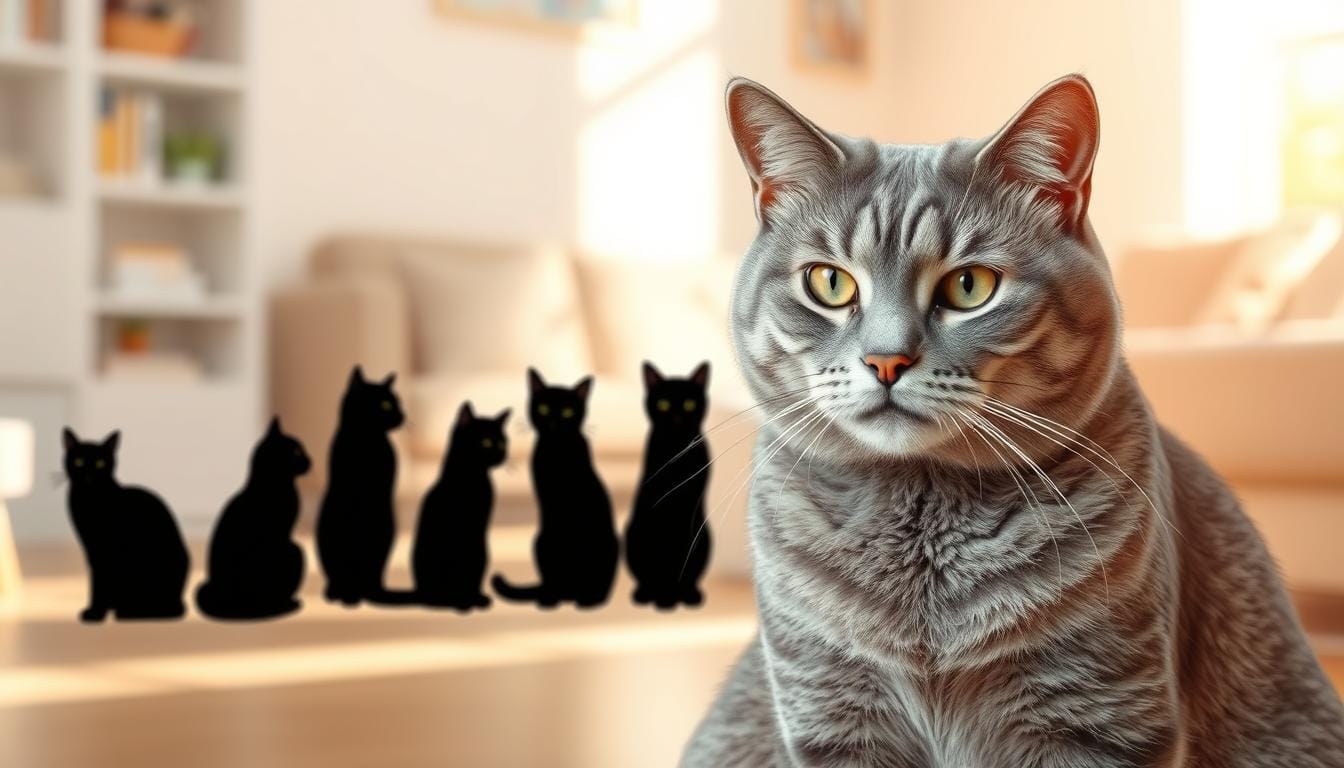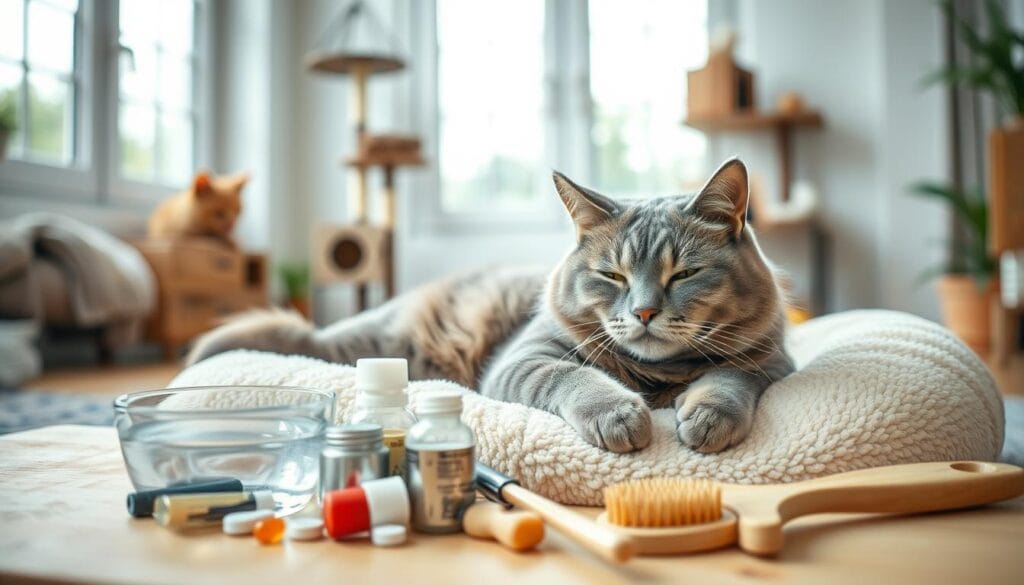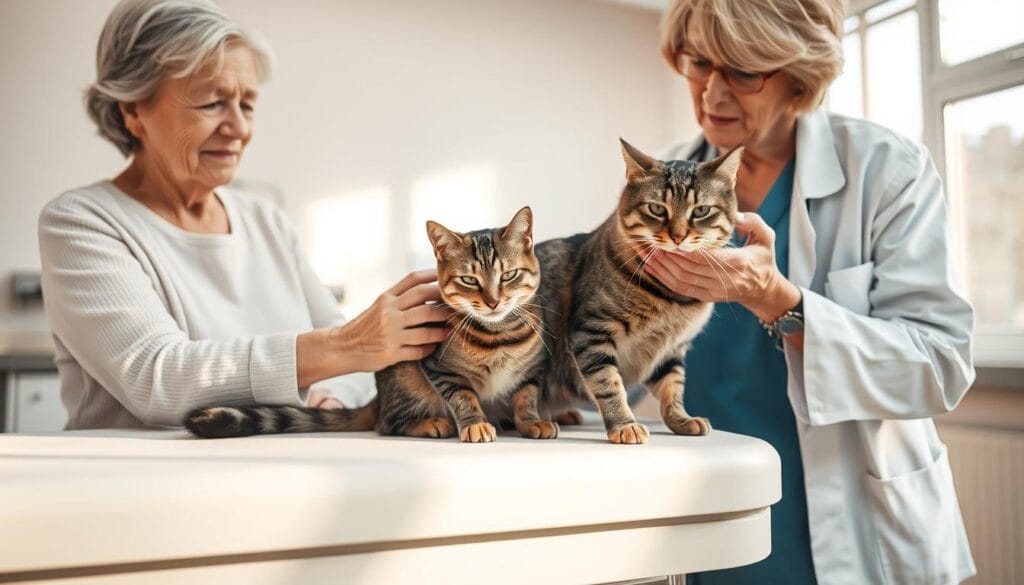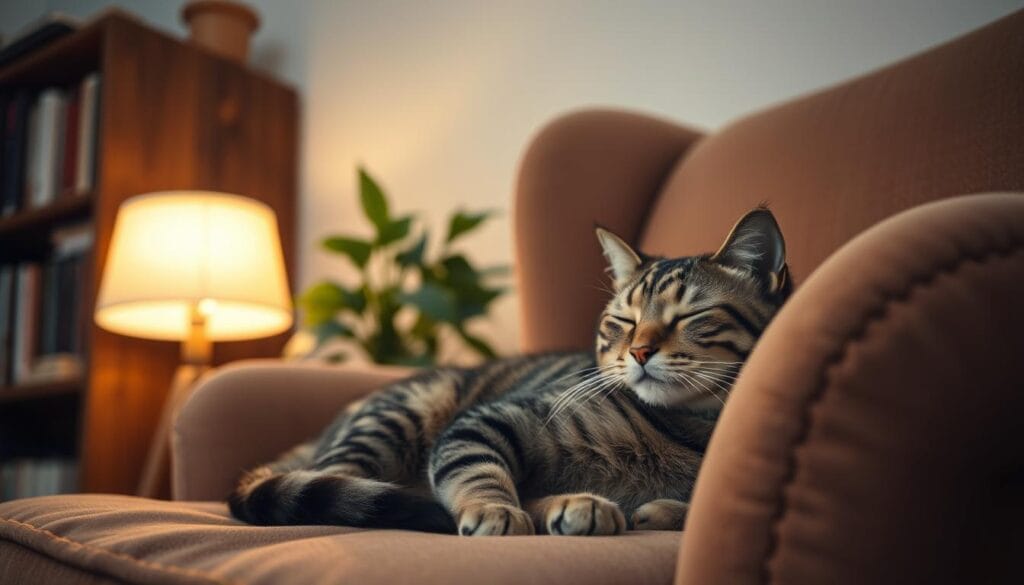
Table of Contents
Ever thought about when your cat becomes a senior? Knowing when your cat is considered senior is key to caring for them well.
Cats age differently than humans. Recognizing when they become seniors helps you meet their changing health needs. The American Association of Feline Practitioners (AAFP) says cats are seniors at 10 years old. But, signs of aging can show up earlier.
When your cat becomes a senior, you’ll see changes in their behavior and health. Knowing what to expect helps you support them. This ensures they stay comfortable and happy.
This guide will cover everything about senior cat age. We’ll look at life stages and how to care for your aging friend. Let’s dive into the world of feline aging together.
Understanding When Cats Enter Their Senior Years
As your cat gets older, knowing their senior age is key for the best care. Cats age differently than humans. Knowing their life stages helps support their health and happiness.
Vets and experts have set guidelines for when cats become seniors. The aging process depends on several factors.
The AAFP Definition of Senior Cats
The American Association of Feline Practitioners (AAFP) offers clear guidelines on senior cat ages:
- Mature adult cats: 7-10 years
- Senior cats: 10-14 years
- Geriatric cats: 15+ years
Why Age 7 Matters in Veterinary Care
At age 7, big health changes start in your cat. Vets suggest more frequent check-ups and detailed health screenings during this time.
| Age Range | Veterinary Recommendations | Health Focus |
|---|---|---|
| 7-10 years | Bi-annual check-ups | Preventive care |
| 10-14 years | Quarterly examinations | Chronic condition monitoring |
| 15+ years | Monthly assessments | Specialized geriatric care |
Life Expectancy of Modern Cats
Thanks to better vet care and food, modern cats live longer than ever. They now live from 13 to 17 years, with some reaching 20 or more.
Knowing your senior cat’s age helps tailor care. This ensures they stay healthy and comfortable in their golden years.
Physical Signs of Aging in Your Feline Friend
As your cat gets older, you’ll see many physical changes. These signs show that your cat is aging. It’s important to watch these changes closely and take your cat to the vet often.
Weight changes are common in older cats. Some may lose muscle, while others might gain weight. This is because they move less. Keeping an eye on these changes helps you know if your cat is healthy and getting the right food.
- Decreased muscle tone and strength
- Reduced flexibility and mobility
- Changes in coat texture and color
- Potential weight loss or gain
Dental health is very important for older cats. You might see:
- Yellowing or discolored teeth
- Difficulty eating
- Potential gum inflammation
- Bad breath
Older cats often have less hearing and vision. This can make it hard for them to interact and behave normally. Adapting their environment gently can make it easier for them.
Look for signs like slower movement and less grooming. Changes in sleep patterns are also common. These signs can help you take care of your older cat’s health and happiness.
Behavioral Changes in Senior Cats
As your feline friend gets older, you’ll see changes in their behavior. These changes are part of aging and need your attention and understanding.
Cats usually start showing these changes around age 7-10. Knowing these signs helps you care for your aging pet better.
Activity Level Changes
Your senior cat will likely have less energy and sleep more. Look out for these signs:
- Shorter playtime
- Slower movements and less jumping
- Longer sleep times
- Less interest in energetic activities
Social Interaction Shifts
Senior cats may change how they interact with others:
- They might prefer quieter places
- They may want to be alone more
- They might need more personal space
- They may show love differently
Cognitive Function Updates
Senior cats can also show changes in how they think. Watch for these signs:
| Cognitive Indicator | Potential Manifestation |
|---|---|
| Disorientation | Getting lost in familiar places |
| Sleep Pattern Changes | More talking at night |
| Interaction Modifications | Less response to things around them |
Understanding these changes helps you care for your senior cat. This way, they can enjoy their golden years comfortably.
Senior Cat Age: Key Milestones and Transitions
When your cat gets older, knowing the important milestones is key. Cats usually become seniors around age 7. Each stage brings its own changes and needs.
The senior cat age can be divided into three main phases:
- Early Senior Stage (7-10 years): Subtle changes start to show
- Mid-Senior Stage (11-13 years): More obvious physical and behavior changes
- Advanced Senior Stage (14-15+ years): Needs more care and watching
In the early senior years, you might see a drop in energy and metabolism. Your cat may want to play less and prefer cozy spots. It’s a natural part of aging that needs careful attention.
Important changes in senior cats include:
- Less mobility
- Changes in sleep patterns
- Potential weight changes
- Less sensitivity to senses
Regular vet visits are crucial as your cat ages. Early checks help catch health issues and keep your cat happy and healthy.
Common Health Issues in Aging Cats
As your feline friend gets older, it’s key to know about health problems. Cats face many medical issues that need attention and care.
Senior cats often deal with health issues that affect their life quality. Spotting these problems early helps in better treatment and care.
Dental and Oral Health Challenges
Senior cats often have oral health issues. Periodontal disease can cause pain and affect their health. Look out for these signs:
- Bad breath
- Difficulty eating
- Visible tartar buildup
- Swollen or bleeding gums
Joint and Mobility Problems
Arthritis and mobility issues are common in older cats. These problems can make your cat less active and uncomfortable.
| Condition | Symptoms | Management Strategies |
|---|---|---|
| Osteoarthritis | Reduced jumping, stiffness | Pain medication, weight management |
| Reduced Flexibility | Difficulty grooming | Assisted grooming, soft bedding |
Organ Function Changes
As cats age, their organs change a lot. Kidney function, metabolism, and more can slow down. They need special care.
- Kidney disease screening
- Regular metabolic blood tests
- Adjusted nutrition plans
- Monitoring hydration levels
Regular vet visits are crucial for managing these issues in your cat’s senior years.
Preventive Care for Senior Cats

When your cat gets older, it’s vital to focus on preventive care. Regular vet visits can spot health problems early. This keeps your cat happy and healthy in their golden years.
Preventive care for senior cats is all about keeping them well-rounded. Your vet will check on your cat’s health with special tests and exams.
- Schedule bi-annual veterinary check-ups
- Conduct comprehensive health screenings
- Monitor weight and body condition
- Assess dental health regularly
- Track mobility and joint function
At-home care is also crucial for senior cats. Watching your cat’s daily habits and changes can help catch health issues early. Look for changes in appetite, energy, and how they move.
Important preventive care steps include keeping a routine, feeding the right food, and making their living space comfortable. This supports their changing needs.
“Early detection and proactive management are the cornerstones of senior cat healthcare” – Veterinary Geriatric Specialists
Nutrition Requirements for Older Cats
When your cat gets older, their diet needs change a lot. It’s very important to feed them right to keep them healthy. This helps them enjoy their golden years.
Tailoring Diet to Senior Cats
Cats usually need special food when they’re about 7 years old. It’s important to think about their changing body needs and health issues.
- Reduce calorie intake to prevent weight gain
- Increase protein quality for muscle maintenance
- Add supplements supporting joint and organ health
- Choose foods with enhanced digestibility
Strategic Feeding Approaches
Your senior cat’s eating schedule should match their health needs. Portion control becomes increasingly important to manage weight and support overall wellness.
- Smaller, more frequent meals
- Consistent feeding times
- Monitor food intake carefully
- Consult veterinarian for personalized recommendations
Nutrition is the foundation of health for senior cats, supporting their quality of life and longevity.
Choosing the right food can help manage age-related conditions. It keeps your senior cat feeling vibrant and energetic.
Creating a Comfortable Environment for Senior Cats
When your cat gets older, making your home more comfortable is key. Senior cats need special care to keep them happy and healthy. This includes changes to their living space to meet their new needs.
To create the best environment for your senior cat, follow these steps:
- Provide easy access to essential resources
- Create warm and comfortable resting areas
- Minimize obstacles that challenge mobility
- Ensure consistent temperature control
Here are some specific changes to make for your senior cat:
- Litter Box Accessibility: Put litter boxes on each floor. Use low-sided containers for easy entry.
- Sleeping Zones: Add soft, supportive beds in quiet, draft-free areas.
- Food and Water Stations: Place multiple stations at different levels to reduce physical strain.
“Comfort is key when supporting your aging feline companion through their senior cat age.” – Veterinary Geriatric Specialists
By making these changes, you can greatly improve your senior cat’s comfort. It helps them face age-related challenges with ease and grace.
Regular Health Monitoring and Veterinary Check-ups
When your cat gets older, it’s vital to take them to the vet regularly. This helps keep them healthy and catches problems early. It’s all about making sure your cat stays happy and healthy as they age.

Vets say it’s best to be proactive with your cat’s health. How often you should visit depends on your cat’s age and health.
Recommended Veterinary Visit Frequency
- Cats aged 7-9 years: Annual comprehensive check-ups
- Cats aged 10-15 years: Visits every six months
- Cats over 15 years: Visits every four months
Essential Health Screenings
At senior cat check-ups, vets do several key tests:
| Screening Type | Purpose | Frequency |
|---|---|---|
| Blood Work | Assess organ function and detect early signs of disease | Twice yearly |
| Urinalysis | Check kidney function and detect urinary tract issues | Twice yearly |
| Blood Pressure | Monitor cardiovascular health | Annually or as recommended |
| Physical Examination | Comprehensive health assessment | Every visit |
Being proactive with your senior cat’s health is key. It helps them live a better life and catches health issues early.
Managing Chronic Conditions in Senior Cats
When your cat gets older, it’s important to manage chronic health issues. Veterinarians know that older cats face certain health problems. These need special care and attention.
Several common chronic conditions can affect senior cats:
- Kidney Disease: Impacts most aging cats, causing progressive organ deterioration
- Hyperthyroidism: Disrupts metabolic functions and hormone balance
- Diabetes: Requires careful monitoring of blood sugar levels
Start by taking your cat to the vet regularly. Your vet can create a treatment plan for your cat’s specific needs.
“Early detection and consistent management are key to supporting your senior cat’s health and comfort.” – Veterinary Specialists
Treatment strategies include:
- Comprehensive diagnostic testing
- Medication management
- Dietary modifications
- Regular monitoring
Each chronic condition needs a careful approach. Working with your vet ensures your cat gets the best care for their health.
Exercise and Mental Stimulation for Aging Cats
Keeping your senior cat active and mentally sharp is key for their health and happiness. As cats get older, their bodies and minds change. So, it’s important to tailor their exercise and mental games.
Even older cats need to stay active, but in a gentle way. They can do low-impact exercises to keep their muscles and joints flexible. Here are some good activities for them:
- Short, gentle play sessions with soft toys
- Interactive laser pointer games with minimal movement
- Supervised climbing on low cat trees
- Soft puzzle feeders that encourage mental engagement
Mental games are also crucial for older cats. They help slow down mental decline. Try these games to keep your cat’s mind sharp:
- Rotate toys to maintain novelty
- Use treat-dispensing puzzles
- Create quiet observation spaces near windows
- Gentle training with positive reinforcement
Always talk to your vet to create an exercise plan for your senior cat. Remember, every cat ages differently. Watch how your pet feels and acts during activities.
Quality of Life Considerations
When your cat gets older, it’s key to keep their life quality high. Senior cats face special challenges that need careful attention and care. Vets stress the need to check your cat’s overall health often.

Checking your senior cat’s life quality is more than just their health. You should look at several important signs of their comfort and joy.
Assessment Tools for Senior Cat Health
Vets suggest using certain tools to check your senior cat’s life quality. These tools help you make the best choices for their care:
- Pain assessment scales
- Mobility tracking charts
- Appetite and hydration monitoring
- Behavioral change logs
Lifestyle Modifications for Comfort
Changing your home can really help your senior cat feel better. Here are some key changes to make:
- Create easy-access resting areas
- Install gentle ramps near favorite spots
- Use orthopedic bedding
- Maintain consistent feeding and medication schedules
Regular vet visits are crucial to ensure your aging cat gets the best care. This is especially true during their senior cat years.
Supporting Your Cat’s Emotional Well-being
As your cat gets older, their emotional health is more important than ever. Senior cats go through big emotional changes. They need extra care and understanding from their owners.
Supporting your cat’s emotional well-being involves a few key steps:
- Maintain consistent daily routines
- Create quiet, comfortable spaces
- Provide gentle, predictable interactions
- Minimize environmental stressors
It’s important to notice emotional changes in your cat as they age. They might become more anxious, shy, or clingy. Patience and compassionate care can help them feel safe and loved.
Here’s how you can support your cat emotionally:
- Gentle physical contact
- Soft speaking tones
- Reduced sudden movements
- Regular but calm interactions
Understanding your senior cat’s emotional needs is key to a good life. Watch for changes in their behavior, mood, and how they interact with others. Your empathy and consistent care can greatly improve their emotional health in their golden years.
Special Care Tips for Cats Over 15
Caring for a senior cat over 15 needs extra love and attention. These older cats need help to stay happy and comfortable. It’s important for pet owners to understand their special needs.
When your cat gets older, there are a few things to keep in mind:
- See the vet more often, every 3-4 months
- Watch their weight and food closely
- Make their home a calm and cozy place
- Change their living space to help with moving around
Senior cats may change a lot physically and mentally. Small changes can help a lot in their daily life. Here are some special care tips:
- Put ramps or steps near where they like to rest
- Use special beds for their joints
- Make sure litter boxes are easy to get to
- Keep their daily routine the same
Food is very important for older cats. Talk to your vet about special diets. They can help with age-related health issues and keep organs working well.
“Compassionate care can transform your senior cat’s golden years into a time of comfort and connection.” – Veterinary Geriatric Specialists
Conclusion
Understanding senior cat age is key to caring for your aging pet. As cats get older, they need special care to live well. Spotting early signs of aging and meeting their health needs can make their life better.
Your vet is a vital ally in caring for your senior cat. Regular vet visits, the right food, and care plans can greatly improve your cat’s life. Paying attention to physical and behavioral changes helps meet their needs in their later years.
Every senior cat is different, needing unique care as they age. Approach this stage with patience, love, and a focus on their health. With the right care, your senior cat can keep enjoying life, bringing happiness and companionship.
Senior cat age is a chance to strengthen your bond and give them the best care. Your commitment can turn these years into a time of comfort, connection, and understanding.
FAQ
At what age is a cat considered a senior?
Cats are seniors around age 7, says the American Association of Feline Practitioners (AAFP). But, age can vary based on breed, health, and lifestyle.
How long do senior cats typically live?
Senior cats can live up to 20 years with good care. Indoor cats live 13-17 years on average. Advances in vet care and nutrition help them stay healthy.
What are the first signs that my cat is entering its senior years?
Look for signs like less activity, weight changes, and grooming issues. They might sleep more, play less, or move stiffly.
How often should I take my senior cat to the vet?
Cats 7-10 years old need vet visits every 6 months. Cats over 11 should go more often, every 4-6 months, for health checks.
What dietary changes are necessary for senior cats?
Senior cats need special food with less protein and calories. It should also have supplements for joints and muscles. Adjust food amounts and frequency as needed.
What are the most common health issues in senior cats?
Senior cats often face dental disease, kidney issues, arthritis, and more. Regular vet visits can catch and manage these problems early.
How can I make my home more comfortable for an aging cat?
Add ramps and steps for easy access. Use orthopedic bedding and low-sided litter boxes. Keep food and water easy to reach and maintain a warm home.
Do senior cats need special mental stimulation?
Yes, they do. Use gentle toys, puzzle feeders, and keep routines consistent. This helps prevent cognitive decline and keeps them mentally sharp.
How can I tell if my senior cat is experiencing pain?
Look for signs like less movement, reluctance to jump, and changes in behavior. Any big changes should be talked about with your vet.
Can senior cats still have a good quality of life?
Absolutely! With the right care, nutrition, and love, senior cats can live happy, comfortable lives for years.






